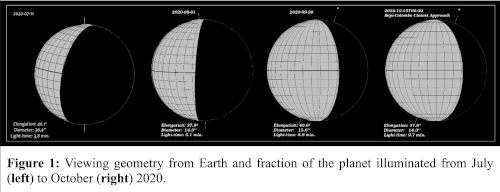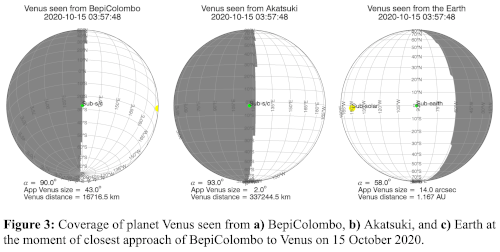Amateur Ground-based Support of the first BepiColombo flyby of Venus
- 1Dpto. Fisica Aplicada I, Escuela de Ingenieria de Bilbao, UPV/EHU, Bilbao, Spain (itziar.garate@ehu.eus)
- 2Technical University of Berlin, Center for Astronomy and Astrophysics, Berlin, Germany
- 3National Institute of Astrophysics INAF, Institute for Space Astrophysics and Planetology IAPS, Rome, Italy
- 4Southwest Research Institute, Boulder, Colorado, USA
- 5Algeciras, Spain
- 6ESA/ESTEC, Noordwijk, Netherlands
- 7JAXA Japan Aerospace Exploration Agency, Sagamihara, Japan
- 8Space Research Institute, Austrian Academy of Sciences, Graz, Austria
The European-Japanese joint mission BepiColombo (ESA/JAXA) will arrive to Mercury on December 2025 after an interplanetary trajectory in which it will perform two flybys of Venus on 15 October 2020 and 11 August 2021. The flybys will be a unique opportunity to study Venus from a multiple perspective. In fact, during the flybys BepiColombo will make Venus observations and measurements in coordination with the Japanese Akatsuki mission, currently in an equatorial orbit around the planet. In addition, a large ground-based campaign to observe Venus has been organized not only during the flyby, but also in August 2020, when Venus reaches its maximum elongation (45º), with an apparent size from Earth of 23-24 arcsec.
Because Venus has a dynamic atmosphere subject to the development of large-scale waves, small scale changes in its winds, and different cloud patterns, and because the views from BepiColombo and Akatsuki are obtained at different phase angles than those observed from Earth, context observations provided by amateur astronomers can significantly enhance the scientific return of the BepiColombo flyby. At the time of this writing (June 2020), we are organizing an additional ground-based amateur campaign to observe Venus during July-October 2020 to support the first Venus flyby. Observations in July will also be used to support the analysis of data acquired during the 3rd flyby of Venus by the Parker Solar Probe on 11 July 2020.
Amateur observations of Venus are regularly posted in the ALPO-Japan webpages (http://alpo-j.sakura.ne.jp/indexE.htm) and in the PVOL database of amateur observations (http://pvol.ehu.eus) and highlights will be posted in the BepiColombo ESA page dedicated to the flyby (https://www.cosmos.esa.int/web/bepicolombo-flyby/venus1flyby).
The campaign has two roads of collaborations. Firstly, we are encouraging amateur observers to observe Venus in July-October with a particular focus on observations at the end of August and in the week of the flyby. Secondly, we encourage amateur observers to apply for observations in the Europlanet Telescope Network (https://bit.ly/2Br5LDt), where observations of solar system targets and ground-based support of space missions are primary themes. The Telescope Network opened its call for observations on 1 June 2020 and it is open to applications from both professional and amateur astronomers. All applications are reviewed by a scientific board. If granted, the Europlanet Telescope Network will support travel, per diem costs, and local accommodation costs of up to two observers, as well as the incurred service costs of the telescope facilities. The network is also open to non-European participants.
Figure 1 summarizes the viewing geometry of Venus during July – October 2020. Amateur observations of the Venus surface are possible in July and August, and observations of the upper clouds in UV and near-infrared wavelengths are possible through July to October.

Figure 2 shows the trajectories of the BepiColombo and Akatsuki missions close to the Venus flyby. These different perspectives result in different geometries of the observations during the flyby as showed in Figure 3.

The Science potential of an Amateur Campaign
We have issued an observational alert and campaign through PVOL with communication of the amateur campaign using social networks such as Facebook amateur astronomy webpages and email lists such as ALPO, hstJupiter and others. The current campaign has been inspired by the excellent observations of Venus obtained during Spring 2020, and the successful scientific use of Venus amateur observations prior to the Akatsuki orbit insertion in 2015 [1] and during the Messenger flyby of Venus in 2007 [2]. Current studies of Venus atmosphere from Akatsuki also show the potential of amateur observations that complement data obtained by large telescopes or from dedicated spacecraft [3]. In this presentation we will show preliminary results of the observations obtained during July-August, perspectives for the closest approach on October 15 and further plans for a similar campaign during the second BepiColombo flyby of Venus in August 2021.
Updated information on the amateur campaign will be available on the PVOL website at: http://pvol2.ehu.es/bc/Venus/
Acknowledgements
Europlanet 2024 RI has received funding from the European Union’s Horizon 2020 research and innovation programme under grant agreement No 871149. Y.J. Lee has received funding from the European’s Union’s Horizon 2020 research and innovation programme under the Marie Sklodowska-Curie grant agreement No 841432. We are very grateful to the ensemble of amateur astronomers sending their data to PVOL and participating in international observation campaigns.
References
[1] Sánchez-Lavega, A., Peralta, J. et al., Venus cloud morphology and motions from ground-based images at the time of the Akatsuki orbit insertion. Astrophysical Journal Letters, 833, L7 (2016), doi: 10.3847/2041-8205/833/1/L7.
[2] Peralta, J., Lee, Y. J. et al. Venus's Winds and Temperatures during the Messenger's flyby: an approximation to a three-dimensional instantaneous state of the atmosphere. Geophys. Res. Lett., 44, 3907–3915 (2017), doi:10.1002/2017GL072900.
[3] Peralta, J., Navarro, T. et al. A Long-Lived Sharp Disruption on the Lower Clouds of Venus. Geophys. Res. Lett., 47, e2020GL087221 (2020), doi: 10.1029/2020GL087221.
How to cite: Garate-Lopez, I., Hueso, R., Lee, Y. J., Mangano, V., Jessup, K. L., Peralta, J., Sanchez-Lavega, A., Zender, J., Benkhoff, J., Murakami, G., and Scherf, M.: Amateur Ground-based Support of the first BepiColombo flyby of Venus, Europlanet Science Congress 2020, online, 21 Sep–9 Oct 2020, EPSC2020-1060, https://doi.org/10.5194/epsc2020-1060, 2020.

